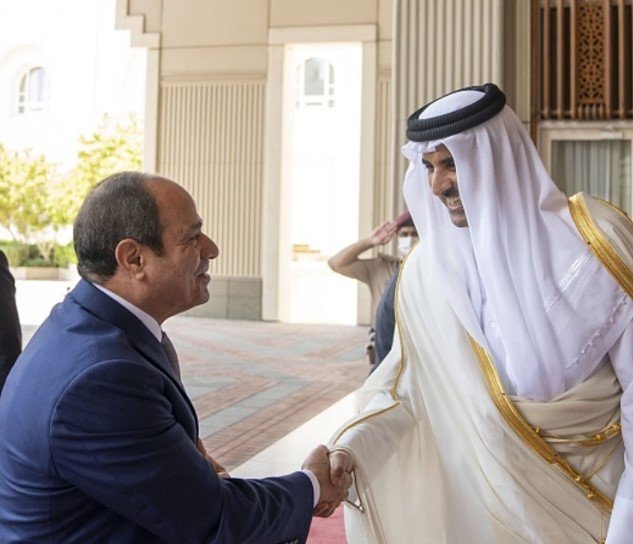Egypt and Qatar have unveiled plans to boost economic ties with a substantial $7.5 billion investment package. The agreement, announced on April 14, 2025, is set to provide a vital financial boost to Egypt, helping the country address its growing foreign debt and expanding budget deficit.
This deal marks another key step in Egypt’s strategy to strengthen its relationship with Gulf nations and attract much-needed investment.
A Strategic Partnership
On Sunday, during a visit to Qatar, Egyptian President Abdel Fattah El-Sisi met with Emir Sheikh Tamim bin Hamad al-Thani to seal the investment agreement. The statement from the Egyptian president’s office confirmed the $7.5 billion investment deal, though specific details of how the funds will be allocated remain sparse.
The package comes at a crucial time for Egypt, as the country struggles with mounting economic challenges, including a ballooning budget deficit and soaring foreign debt. By securing this agreement, Egypt is clearly looking to secure financial stability from its Gulf allies.
For Qatar, this investment solidifies its role as a major economic partner in the region, especially as it looks to expand its influence by supporting neighboring economies like Egypt’s. With a shared interest in regional stability, this agreement also marks an important diplomatic step.

Egypt’s Growing Economic Crisis
The investment deal is part of Egypt’s broader strategy to attract foreign capital to ease its ongoing financial difficulties. The country has seen its debt rise steadily in recent years, exacerbated by global economic pressures and domestic challenges. Its currency, the Egyptian pound, lost over 35% of its value against the U.S. dollar in recent months, adding pressure on inflation and increasing the cost of living for many Egyptians.
To stabilize the economy, Egypt has implemented a range of economic reforms. These include significant measures such as depreciating the pound and hiking interest rates to attract foreign capital. These bold steps, while controversial, reflect the country’s urgent need for external financial support.
The Qatari investment could play a key role in stabilizing Egypt’s foreign reserves and providing liquidity to the country’s economy. Still, analysts are cautious. “While this is a positive development, it remains to be seen how effectively these funds will be utilized to address Egypt’s underlying economic issues,” said Amira Hassan, an economist at Cairo University.
Boosting Confidence with Gulf Allies
The $7.5 billion investment agreement follows a similar deal Egypt signed with Abu Dhabi’s sovereign wealth fund, ADQ, in 2024. The Abu Dhabi deal is expected to bring in $35 billion, with a significant portion allocated to the development of a new city at Ras El Hekma, along Egypt’s Mediterranean coast. This agreement, like the Qatar deal, demonstrates Egypt’s efforts to secure strategic investments that will boost its long-term economic prospects.
However, with the country’s debt burden mounting and its need for capital urgent, these deals are more than just symbolic gestures. They represent Egypt’s reliance on Gulf partners for its economic survival. “Egypt’s current economic strategy heavily leans on Gulf nations, and that dependency is likely to continue for the foreseeable future,” noted analyst Tarek Hussein.
Reforms and Regional Support
In addition to securing investment, Egypt has taken steps to implement broad economic reforms, many of which have been supported by Gulf nations. The UAE, for instance, has provided crucial financial support, allowing Egypt to secure a larger loan from the International Monetary Fund (IMF), which has risen to $57 billion. This arrangement has been vital in preventing Egypt from facing a full-blown financial crisis.
With Egypt struggling to balance its budget and stabilize its currency, securing large-scale foreign investments has become a central component of the country’s economic strategy. These investments are aimed at boosting local industries, stabilizing currency reserves, and creating jobs.
For Qatar, this partnership offers not just economic benefits but also strengthens its diplomatic ties in the region. Qatar has long been a key player in Middle Eastern politics, and this investment deal is another step in solidifying its position as a major investor in the Arab world.
Challenges Ahead
Despite the optimism surrounding these deals, Egypt’s economic troubles are far from over. The $7.5 billion deal with Qatar is a significant development, but many questions remain about how effectively the funds will be used and whether they can truly resolve the country’s deep-rooted financial issues.
The Qatari investment is a positive sign, but it may not be enough to solve Egypt’s broader economic challenges. Rising inflation, unemployment, and social unrest could continue to pose obstacles to Egypt’s long-term stability. Still, for now, the country is focused on leveraging its relationships with Gulf partners to keep its economy afloat.
The real test will be whether these investments translate into tangible economic growth or if Egypt finds itself needing even more support from its regional allies. As Gulf nations continue to pour funds into Egypt’s economy, the long-term success of these efforts will depend on how well the country can implement reforms and manage its complex financial situation.
